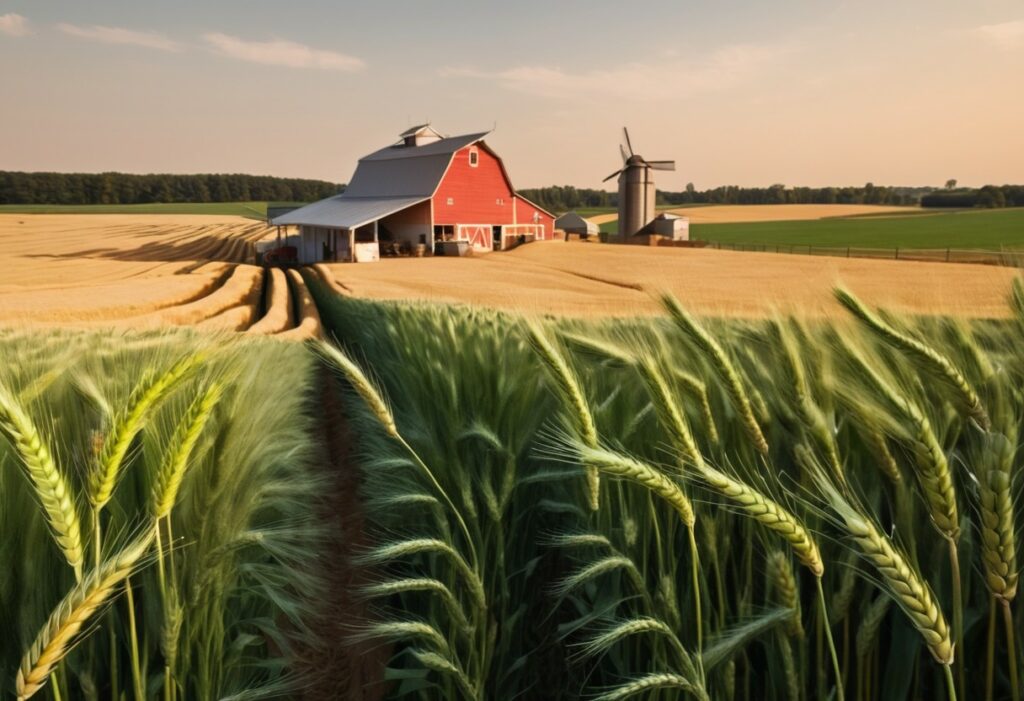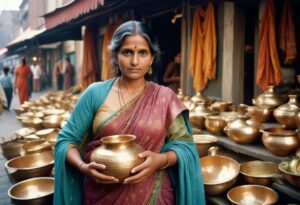With so many problems like not having enough food, harming the environment, and unequal access to food, it’s really important to create a food system that’s fair and strong. This kind of system makes sure everyone can get healthy food and also takes care of the environment, saves different kinds of plants and animals, and helps communities. In this article, we’ll look at different ways to make our food system fair, sustainable, and strong, from how we grow and share food to how we eat it.
Sustainability in Agriculture
Sustainable farming is really important for making sure our food system is fair and strong. It’s all about taking care of nature, being responsible to society, and making sure farms can keep going. Sustainable farming focuses on working together with nature, not against it.
There are different ways farmers can do this, like organic farming, agroforestry, and regenerative agriculture. Organic farming uses natural ways to grow crops, without chemicals, which helps keep the soil healthy and supports lots of different plants and animals. Agroforestry mixes trees with crops or animals, which helps save soil, capture carbon, and make more biodiversity. Regenerative agriculture takes it a step further by fixing land that’s been damaged and making soil healthier with methods like growing cover crops, rotating where animals graze, and not digging up the soil too much.
These kinds of sustainable farming not only help protect nature but also help fight climate change. By keeping lots of different plants and animals around, storing carbon in soil and plants, and making sure ecosystems can handle tough weather, sustainable farming helps make our food system stronger for the future. Embracing sustainable farming is really important for keeping our environment healthy, our communities strong, and making sure everyone has enough food.
Equitable Access to Food
In a fair food system, everyone should be able to get safe, healthy food, no matter where they live or how much money they have. But there are lots of things that get in the way of this, like unfair rules and problems in the way food is grown and shared around the world.
Community projects like gardens, farmers’ markets, and food co-ops are really important for making sure everyone can get good food. These projects let local communities grow and get fresh food, support local businesses, and cut down on how far food has to travel. When people grow and buy food close to home, it helps make sure everyone in the community can be part of deciding how food is made and shared.
Also, we need rules and programs that make sure everyone can get food they need. Programs that help people get food and money when they need it, like food assistance and income support, are really important. These programs help stop hunger and make sure everyone has a fair chance to get the food they need to be healthy.
Getting fair access to food is really important for everyone, and it’s something we all deserve. By changing unfair rules, supporting local projects, and making sure everyone has what they need, we can make a world where everyone can get the food they need to live a good life.
Resilient Supply Chains
In our world today, it’s really important to make sure our food supply chains are strong enough to handle unexpected problems like pandemics, bad weather, or money troubles. A strong food supply chain is one that can adjust and deal with these kinds of issues so that people can still get the food they need.
One way to make food supply chains stronger is by diversifying. This means getting food from different places and using different ways to deliver it. When food businesses do this, they’re less likely to have big problems if something goes wrong in one area. Also, supporting local farmers and small businesses can help because it means we don’t have to rely on food from far away.
It’s also important to have good storage and transportation for food. Having enough places to store food and good ways to move it around keeps it fresh and safe, especially when things get tough.
Using technology can make food supply chains even stronger. Things like blockchain and predictive analytics can help track food from where it’s made to where it’s eaten. This makes it easier to see if there are any problems and fix them fast, so less food goes to waste and it’s safer to eat.
Making our food supply chains resilient is super important for keeping our food systems stable and safe. By getting food from different places, improving how we store and move it, and using technology to keep track, we can make sure we’re ready for whatever challenges come our way.
Empowering Small-Scale Producers
Small farmers, fishermen, and indigenous groups are really important in making food for the world. They often don’t have a lot of resources and face many problems. Even though they help a lot, they often get treated unfairly, with some losing their land or being taken advantage of. Helping these small producers is super important for making a food system that’s fair and strong.
One big way to help small producers is to make sure they have what they need, like land, money, and places to sell their goods. When farmers know they can keep their land, they’re more likely to invest in it and use good practices to make it better. Giving them access to money means they can buy what they need to grow their businesses and sell their stuff. Also, making sure they can sell their products in fair markets where they get good prices means they can earn enough to live well and make their lives better.
Encouraging farmers to use farming practices that work with nature is another way to help. This means doing things that make the soil healthy, save water, and protect different plants and animals. When farmers use these methods, it helps them deal with things like climate change and they don’t have to spend a lot on things like chemicals.
Helping farmers work together in groups is also important. When they team up, they can share what they know, sell their products together, and ask for better treatment. Plus, being in a group makes them feel like they’re part of something bigger, and they can help each other out when things get tough.
Making sure small producers have what they need is key to making a food system that’s fair and strong. By giving them resources, encouraging good farming practices, and helping them work together, we can support them while also protecting nature and different cultures.
Education and Awareness
Teaching people about food and making them aware is super important for making food systems better for everyone. When people know how their food choices affect the environment, society, and health, they can start asking for food that’s made in a good way. This means they can support things like fair trade, stop wasting food, and help take care of nature.
It’s also important to teach kids about food in school. By learning about things like farming, eating healthy, and making sure everyone gets fair treatment, kids grow up knowing how to make good choices about food.
Another thing that helps is celebrating local food and traditions. By showing off all the different foods and ways of cooking, communities can appreciate where their food comes from and support local farmers and cooks.
Making food systems better is a big job that needs everyone to work together. Governments, groups, businesses, and people need to join hands to make sure food is made, shared, and eaten in a good way. If we care about fairness and making sure everyone has what they need, we can build a world where food is good for people and the planet. Let’s work together to make this happen!










More Stories
Beyond the Plate: The Environmental, Economic, and Social Impact of Global Food Waste
Balancing Act: Aquaculture’s Impact on Biodiversity Conservation
Onions: Trends and Opportunities in the Global Market